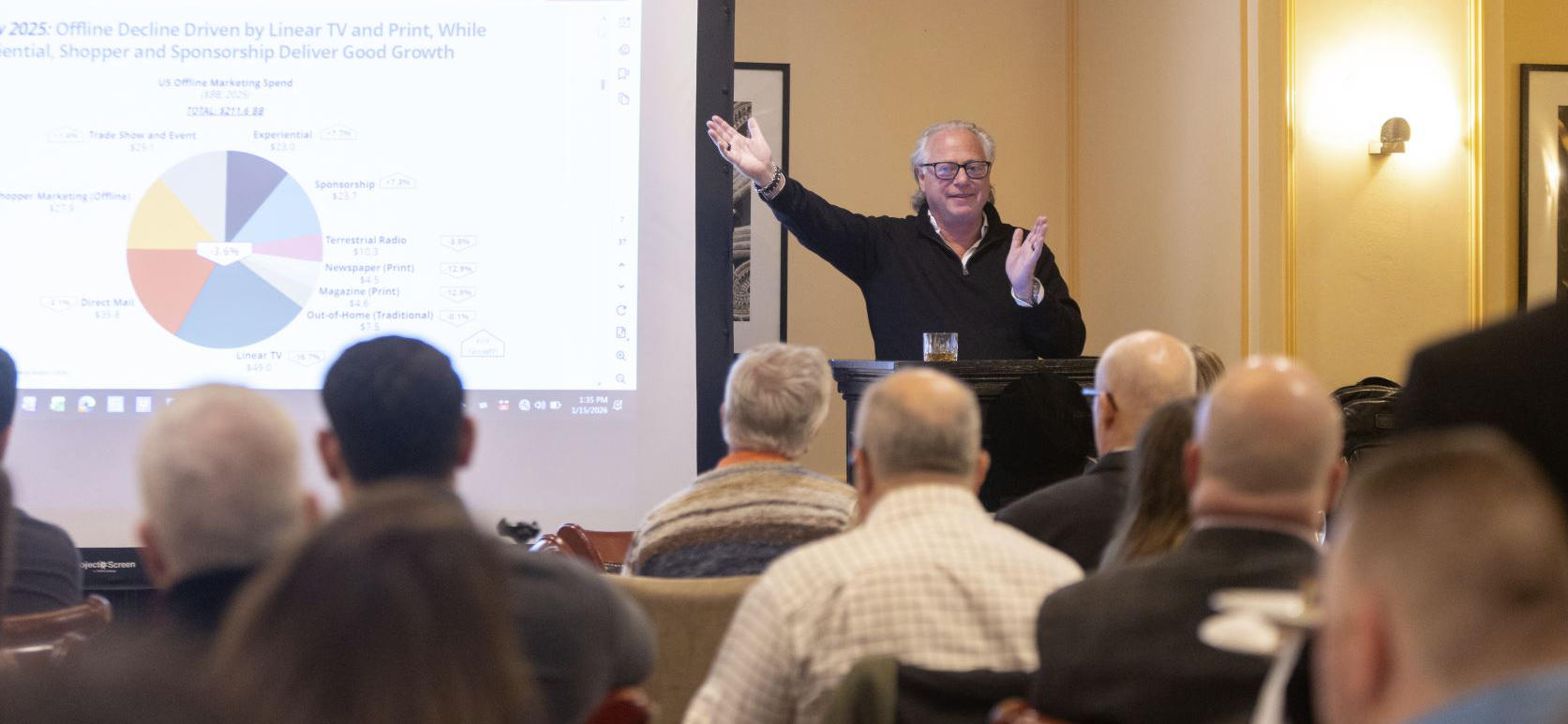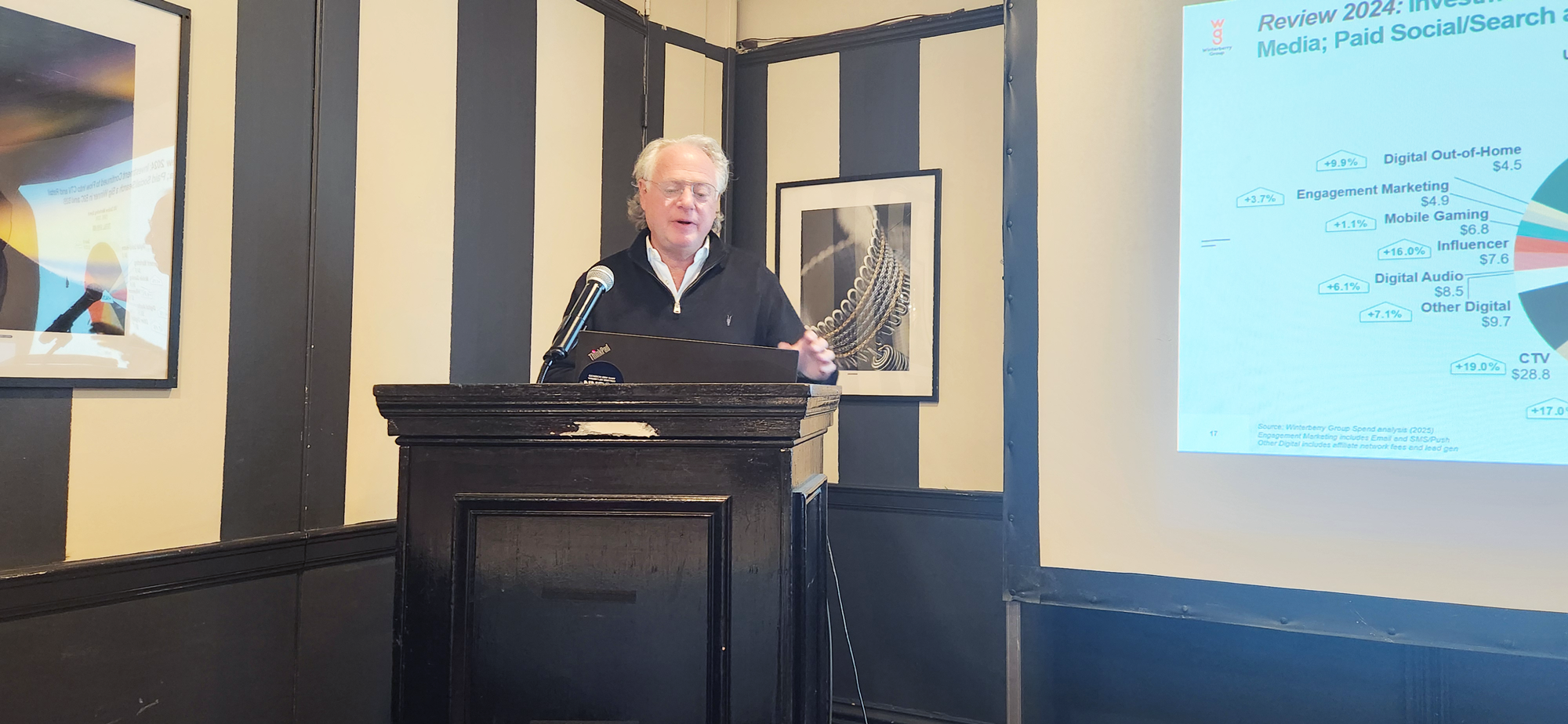By Chet Dalzell

It is spring 2023 and live events are back on Marketing Club of New York’s calendar. While many marketers still are not back full time in their offices — and Manhattan sidewalks ebb and flow accordingly — that didn’t keep two dozen MCNY members and guests from coming together midday for a luncheon event and a touch of networking late last month. Attendees hailed from Connecticut, Westchester, Long Island, New Jersey, of course, NYC.
Their reward? A great meal at Arno Ristorante and a history lesson with Christina Inge, founder and CEO of Thoughtlight, an integrated data-driven marketing agency in Boston, and a professor at Northeastern, Brandeis and Harvard. A recording of the event is posted on “Talking Business with Ken Kraetzer,” who introduced Inge on behalf of the MCNY Board and the club.
Beware of preconceptions in your data models Inge, an author of two books on marketing analytics, knew she was with professional peers who live, work and breathe data measurement, applied insights and objective-driven marketing strategy and implementation. So, she dispensed with excerpts from her “little encyclopedia” on engagement metrics, multi-variant testing, media mix modeling and so on. Instead, she invite the assembled to divvy up into three groups, to think of a product or service fit for one of three customer groups:
- Travelers with animals
- LGBTQ+ millennials
- Parents with several daughters
Attendees suggested pet carriers for group one, dance music festivals for group two, and insurance for group three. But there was a twist. We brought our preconceptions to the marketplace, Inge said. Our recommendations didn’t apply to three historical figures who also fit the customer descriptions: Hannibal and his elephants; Alexander the Great; and Genghis Khan.
“If you’re going to sell based on an AI [artificial intelligence] model, you’re going to sell things to people using a couple of data points that have stereotypically outputs,” Inge said. For this reason, the human element will always be needed to govern AI, she asserted. “You may accidentally sell the right thing to the right person, or you could be selling real estate to someone who has conquered all the known world…. Data-driven marketing is learning to think with data.”
AI models don’t really create, they imitate
“We spend our entire careers as marketers not just with one data point, but dozens and dozens of data points – all to better understand our customers in context,” Inge added. “What I want you to lean into is…data-driven marketing is learning to think with data.”
Every predictive model should be tested, queried, critiqued because machine-learning can easily be garbage in-garbage out, she said. If the underlying bias goes undetected and isn’t eliminated, any outcomes are suspect. “You can go completely off track.”
Inge assured attendees that ChatGPT and other AI software are simply tools, and not our professional replacements. Understanding deeper contexts of customers requires human interaction, she said.
How to beat Sparta
Turning to history again, Inge relayed the story on how Sparta, a military autocracy, and Athens, the founder of democracy, were locked in competition. Sparta hated democracy, and built a military machine through phalanx warfare — columns of shields and swords working in unison. Sparta was ascendant, even dominant, and no one understood how they could be defeated. No one, that is, except the hokiest of the democratic states, Thebes (Boeotia, literally “Cowland” in Greek).
As Sparta came upon Thebes, the locals — greatly outnumbered — split into wings. The maneuver broke the phalanx, and Spartan warriors, trained as a unit, were unable to match the agility and individual warfare of the democrats. As the Spartan leadership retreated, they were met from behind and defeated. Speed and agility triumphed over might and power.
“There was no individuality among the Spartans,” Inge said. Military training from the time they were children beat it out of them. As a result, it took Thebes 57 minutes to defeat the Spartan army.
“As marketers, we, too, need to have resilience and quickness on our feet to look at circumstances as they change and unfold,” she said. “We need our ability to meet threats and make change, by thinking individually as human beings.” Ordinary people who can fall back on their own knowledge with critical thinking can achieve extraordinary results.
You may think you’re marketing to travelers with pets, only to find a horde of elephants. As marketing professionals, Inge reminded us, we control the AI, not the other way around. And qualitative data — a conversation with your client or customer — can reveal the need for a new product feature, for example, that may never be apparent in our quantitative analysis.
Keep having those conversations.

Chet Dalzell | About the Author
Chet Dalzell has more than 25 years of public relations management and expertise in service to leading brands in consumer, donor, patient and business-to-business markets, and in the field of integrated direct marketing. He serves on the Association of National Advertisers International ECHO Awards Board of Governors, as a Board Member to the Marketing Club of New York, and is senior director, communications and industry relations, with the Digital Advertising Alliance, a privacy self-regulatory program for data collection for digital and mobile interest-based advertising.








